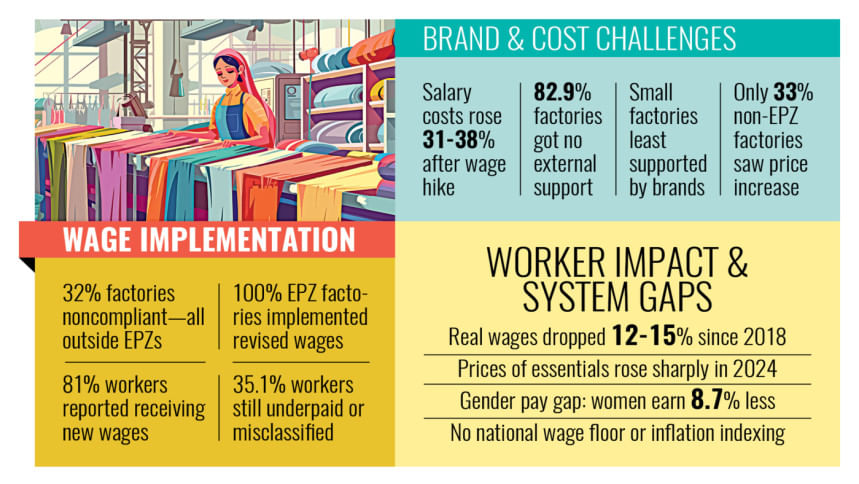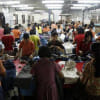One third of RMG factories yet to implement new wage: study

In spite of a government directive given in December 2023 for increasing minimum wages in the readymade garment (RMG) sector, nearly one third of factories have failed to implement a revised pay scale, according to a new study.
All of the non-compliant factories are located outside the country's export processing zones (EPZs), the research revealed.
The study was conducted by STITCH, a consortium advancing improved working conditions, in collaboration with BRAC University between September and December 2024. It was made public on Tuesday.
It surveyed 385 RMG factories and 1,113 workers to assess the wage implementation status, socio-economic impact on workers, and structural challenges in wage governance.
The wage revision set a new minimum of Tk 12,500 for non-EPZ factories and Tk 12,800 for those inside EPZs.
While the increase was expected to improve the lives of workers in the country's largest export sector, the findings suggest a significant portion of factories—32 percent—have not complied.
While the increase in wage was expected to improve the lives of workers in the country's largest export sector, the findings suggest a significant portion of factories—32 percent—have not complied
However, the report said, 100 percent of the non-compliant factories were from the non-EPZ segment.
In contrast, all surveyed EPZ factories were found to have fully implemented the new wage. Large factories and those with active trade unions or participation committees also showed complete compliance.
Most compliant factories were affiliated with major industry associations, which appear to influence better wage practices, the report said.
On the workers' side, most reported receiving the revised pay.
The report said that still, a notable number remain underpaid—often due to confusion about job grades or lack of information about their entitlements.
Many workers could not even identify their current grade under the new wage scale, pointing to gaps in communication and awareness.
However, it said the wage increase has put financial pressure on factories. Operating costs have risen significantly, but most have received no help from buyers or government sources.
A very small fraction of factories benefited from any wage-related support, either in the form of higher prices or direct assistance.
The situation was worse for smaller factories, which received the least support from buyers. Even when prices were adjusted, the changes were modest.
Western brands, especially from Europe and North America, offered better support than others, but the gap remains wide, it added.
For many factories, the increased cost of doing business has become difficult to bear. Rising expenses, paired with minimal buyer cooperation, were the main reasons cited for non-compliance with the new wage.
The study pointed out that workers, meanwhile, are seeing their purchasing power decline. Inflation of essentials like food, rent, education, and healthcare has eroded the benefits of higher wages.
At the same time, many workers report increased workloads and longer hours.
The study also highlighted gender-based pay gaps. Women remain concentrated in repetitive, lower-paid roles, while men dominate technical and better-paying positions. Even when doing similar jobs, men often earn more.
The current process lacks true worker representation, and planning between factories and buyers is weak.
Without urgent reforms and better coordination, the intended benefits of the wage hike may not reach the workers it was meant to support.

 For all latest news, follow The Daily Star's Google News channel.
For all latest news, follow The Daily Star's Google News channel. 







Comments